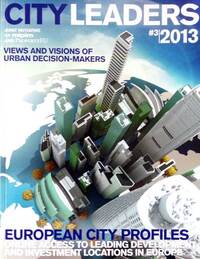The New Urban Agenda –the Perspective of New Towns
Article by Michelle Provoost
The global urbanization, which is presently taking place, is predicted to lead to 70% of the global population living in cities by 2050. This makes clear that cities will define the social, economic, cultural and ecological quality of human life in the 21th Century. It stresses the importance to redefine what our cities should be and the necessity to involve all the parties that are engaged with planning, developing, governing and managing cities.
In recognition of the urgency of improving cities, the “New Urban Agenda” will be ratified at the Habitat III conference in Quito, Ecuador (...)
Bottom-up is not enough
Article by Michelle Provoost
In the sixth year of the global economic crisis some interesting shifts have become visible in the architecture world. The stream of great iconic buildings (designed by the likes of Zaha Hadid, Jean Nouvel, OMA, Foster, etc.) commissioned by commercial developers has lost momentum. Prestigious projects that were the architectural contribution to the globally accelerating construction economy have stalled. Buildings that had no real bearing either on functional or cultural needs but rather worked as a businessmodel, connecting to global capital flows and serving the global competition (...)
A City of Comings and Goings
Article by Wouter Vanstiphout and Michelle Provoost
Scrolling through the long list of victims of Friday 13 November 2015 in Paris, we see a heart-rending portrait of a young cosmopolitan generation from very diverse backgrounds: from the banlieues to the world of international architecture. They are not only lucky students who have seen the world on fellowships or foreign tourists enjoying themselves in Paris’s concert venues and trendy bars. Some of the victims were French citizens who had emigrated from Chile as children; others have parents who emigrated from Algeria or Congo in the 1970s.
The victims represent an urban class that (...)
Tema Manhean
Article by Michelle Provoost
In 1952, a year after Kwame Nkrumah became the first Prime Minister of what was then the British colony of the Gold Coast (now Ghana), the decision was made to build a brandnew harbour as part of the ambitious Volta River Project. [1] For the relocation of Tema, a small fishing village that stood in the way of the new development, the English office of Maxwell Fry, Jane Drew and Denys Lasdun was engaged.
Exporting New Towns. The Welfare City in Africa
Article by Michelle Provoost
Looking at the cities that were built from scratch during the fifties and sixties all over the world, it is astonishing to see how uniform the world population growth was spatially accommodated in places extremely remote and different in culture and political background. The roots of this phenomenon can easily be traced back to the New Towns around London from the forties. Starting in the UK, these New Towns soon became the panacea for urban growth in Western Europe. The new cities around Stockholm, towns like Hoogvliet in the Netherlands and the Villes Nouvelles around Paris: all these (...)
The Openheid State. From closed to open society in Cape Town
Article by Michelle Provoost
It is hard to conceive of a country where contemporary city planning has had a more negative impact on society than in South Africa. In this country, the ‘makeable’ world and social engineering were so ‘successful’ thanks to the apartheid regime that the potential of city planning to shape society has been proven beyond a shadow of a doubt. In Cape Town, apartheid is set in stone and poured in concrete.
To predict the future of technology, figure out how bureaucrats will use it.
Article by Michelle Provoost
Few trends in the professional world of architecture and planning have been as annoying over the last few years as the Smart City phenomenon, but now it’s time to give up resistance: it seems like Smart Cities are here to stay.
Why are Smart Cities so annoying? In the first place it’s the old-fashioned futurism, the jubilant mood about new technologies, predicting how the world will become a better place by employing an endless stream of gadgets and technological inventions. As always, the suggestion is raised that technology is an objective and value free issue, and anyone can (...)
In search of new values
Article by Michelle Provoost
While many new cities are being built worldwide the private sector is taking many of the traditional roles of the government in planning and governance. What does that mean for the quality of our future cities? And what role is there in this new constellation for city leaders?
In Western Europe the idea of building a new city from scratch has not been a relevant issue now for the last decades. It used to be on our agenda to solve the housing shortage during the postwar years and lead to hundreds of so called New Towns all over Europe. But now that economic growth has shifted to Asia, (...)










